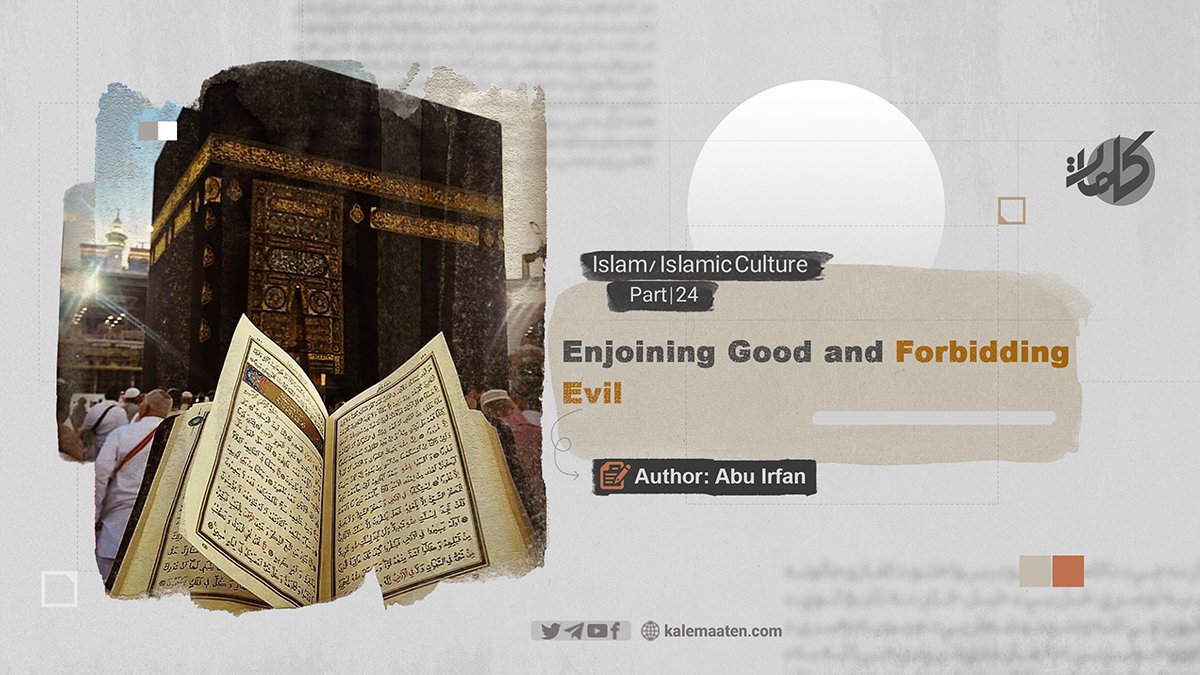Author: Abu Irfan
Enjoining Good and Forbidding Evil (Part 24)
Attributes of the Enforcer of Good and the Prohibitor of Evil
Sincerity in Action:
Sincerity and devotion to Allah in all actions are fundamental principles that must be upheld in every deed and under all circumstances. Allah (s.w.t) emphasizes sincerity in actions, saying: «وَمَآ أُمِرُوٓاْ إِلَّا لِيَعۡبُدُواْ ٱللَّهَ مُخۡلِصِينَ لَهُ ٱلدِّينَ حُنَفَآءَ وَيُقِيمُواْ ٱلصَّلَوٰةَ وَيُؤۡتُواْ ٱلزَّكَوٰةَۚ وَذَٰلِكَ دِينُ ٱلۡقَيِّمَةِ» Translation: “And they were commanded only to worship Allah, dedicating their religion sincerely to Him—inclining towards monotheism [and the faith of Abraham]—and to establish prayer and give zakat. And this is the true and straight religion.” [Al-Bayyina: 5]
Additionally, in Surah Al-A’raf, it is stated: «قُلْ أَمَرَ رَبِّى بِٱلْقِسْطِ ۖ وَأَقِيمُوا وُجُوهَكُمْ عِندَ كُلِّ مَسْجِدٍ وَٱدْعُوهُ مُخْلِصِينَ لَهُ ٱلدِّينَ ۚ كَمَا بَدَأَكُمْ تَعُودُونَ» [Al-A’raf: 29]; Translation: “Say: My Lord has commanded justice, and (also) that you turn your faces towards Him in every place of worship (and at every prayer) and call upon Him (in supplication and worship), while keeping your religion pure for Him. Just as He created you at the beginning, so shall you return to Him after death.”
He has also stated regarding sincerity and sincere servants: «إِلَّا عِبَادَكَ مِنْهُمُ ٱلْمُخْلَصِينَ» [Al-Hijr: 40] Translation: “Except Your pure servants from among them.”
Regarding the impact of sincerity in actions, even in the actions of those who did not have a correct and proper understanding of Allah, and who were not sincere servants for Allah, He says: «هُوَ ٱلَّذِى يُسَيِّرُكُمْ فِى ٱلْبَرِّ وَٱلْبَحْرِ ۖ حَتَّىٰٓ إِذَا كُنتُمْ فِى ٱلْفُلْكِ وَجَرَيْنَ بِهِم بِرِيحٍ طَيِّبَةٍ وَفَرِحُوا بِهَا جَاءَتْهَا رِيحٌ عَاصِفٌ وَجَاءَهُمُ ٱلْمَوْجُ مِن كُلِّ مَكَانٍ وَظَنُّوٓا أَنَّهُمْ أُحِيطَ بِهِمْ ۙ دَعَوُا ٱللَّهَ مُخْلِصِينَ لَهُ ٱلدِّينَ لَئِنْ أَنجَيْتَنَا مِنْ هَـٰذِهِۦ لَنَكُونَنَّ مِنَ ٱلشَّـٰكِرِينَ» Translation: “He it is who drives you in the land and the sea; until when you are in the ships and they sail with them with a good wind, and they rejoice in it, there comes a stormy wind, and the waves come to them from every place, and they think they are surrounded; they call upon Allah, sincere to Him in religion: ‘If You save us from this, we will surely be among the grateful.'” [Yunus: 22]
In Surah Al-Ankabut, the same theme is expressed with shorter and clearer words: «فَإِذَا رَكِبُوا فِى ٱلْفُلْكِ دَعَوُا ٱللَّهَ مُخْلِصِينَ لَهُ ٱلدِّينَ فَلَمَّا نَجَّىٰهُمْ إِلَى ٱلْبَرِّ إِذَا هُمْ يُشْرِكُونَ» Translation: “So when they embark on the ship, they call upon Allah, sincere to Him in religion. But when He saves them to the land, at once they associate others with Him.” [Al-Ankabut: 65]
«وَإِذَا غَشِيَهُم مَّوْجٌ كَٱلظُّلَلِ دَعَوُا ٱللَّهَ مُخْلِصِينَ لَهُ ٱلدِّينَ فَلَمَّا نَجَّىٰهُمْ إِلَى ٱلْبَرِّ فَمِنْهُم مُّقْتَصِدٌ ۚوَمَا يَجْحَدُ بِـَٔايَـٰتِنَآ إِلَّا كُلُّ خَتَّارٍ كَفُورٍ» [Luqman: 32]; Translation: “And when (in the sea) a wave covers them like canopies, they call upon Allah sincerely, but when He saves them to the land, then some of them take the path of moderation (and remain steadfast in their faith and covenant, while others choose the path of disbelief), and none deny Our signs except every treacherous, ungrateful person.”
In this section, there are many verses that address the topic of sincerity in action and remind humans that sincerity is commendable, worshipful, and valuable in all circumstances, especially when it comes from the heart and is present in all situations—not only in hardships and adversities when pressure is applied to a person. In such cases, the servant should humble themselves and practice sincerity in their actions and conduct.
In Surah Al-Saffat, this verse is repeated five times in these words, indicating the importance and value of the subject: «إِلَّا عِبَادَ ٱللَّهِ ٱلْمُخْلَصِينَ» [As-Saffat: 40]; Translation: “Except for the sincere servants of Allah.”
In Surah Yusuf, referring to the topic of Prophet Joseph’s nobility and purity, and his distance from immorality and wrongdoing, which is indeed a commendable act, it is stated: «وَلَقَدْ هَمَّتْ بِهِۦ ۖ وَهَمَّ بِهَا لَوْلَآ أَن رَّءَا بُرْهَـٰنَ رَبِّهِۦ ۚ كَذَٰلِكَ لِنَصْرِفَ عَنْهُ ٱلسُّوٓءَ وَٱلْفَحْشَآءَ ۚ إِنَّهُۥ مِنْ عِبَادِنَا ٱلْمُخْلَصِينَ» [Yusuf: 24]; Translation: “And indeed, that woman intended him (Joseph), and he would have inclined to her if he had not seen the proof of his Lord. Thus, we did this to turn away from him evil and immorality. Indeed, he was of Our sincere servants.”
However, Allah, the Exalted, seals this matter completely in Surah Ghafir, beautifully and clearly expressing its essence and ultimate conclusion, elucidating the sincerity in action in a completely evident manner, which is only valued in such cases, and through these methods, they are beloved and desirable. He says: «فَٱدْعُوا۟ ٱللَّهَ مُخْلِصِينَ لَهُ ٱلدِّينَ وَلَوْ كَرِهَ ٱلْكَـٰفِرُونَ» [Ghafir: 14]; Translation: “So call upon Allah while making your religion sincere for Him, even though the disbelievers dislike it.”
He has also stated: «هُوَ ٱلْحَىُّ لاَ إِلَـٰهَ إِلَّا هُوَ فَٱدْعُوهُ مُخْلِصِينَ لَهُ ٱلدِّينَ ۗ ٱلْحَمْدُ لِلَّهِ رَبِّ ٱلْعَـٰلَمِينَ» [Ghafir: 65]; Translation: “He is the Ever-Living; there is no deity (rightfully) except Him, so invoke Him while making your religion sincere for Him. All praise is due to Allah, Lord of the worlds.”
The Messenger of Allah (peace be upon him) would say after the obligatory (Farz) prayers: «لَا إِلَهَ إِلَّا اللهُ وَحْدَهُ لَا شَرِيكَ لَهُ، لَهُ الْـمُلْكُ وَلَهُ الْـحَمْدُ وَهُوَ عَلَى كُلِّ شَيْءٍ قَدِيرٌ، لَا حَوْلَ وَلَا قُوَّةَ إِلَّا بِاللهِ، لَا إِلَهَ إِلَّا اللهُ، وَلَا نَعْبُدُ إِلَّا إِيَّاهُ، لَهُ النِّعْمَةُ وَلَهُ الْفَضْلُ، وَلَهُ الثَّنَاءُ الْحَسَنُ، لَا إِلَهَ إِلَّا اللهُ مُخْلِصِينَ لَهُ الدِّينَ وَلَوْ كَرِهَ الْكَافِرُونَ[1]» Translation: There is no deity (worthy of worship) except Allah; He is unique and has no partners. Sovereignty belongs to Him, and praise is exclusively for Him. He is capable of all things; there is no power or strength except through Allah and His generosity. There is no deity (worthy of worship) except Him; we do not worship anyone but Him. Blessings and grace are from Him, and good praise is exclusively for Him. There is no deity besides Him; all of us sincerely worship Him, even if the disbelievers dislike it.
The meaning of sincerity in action is not merely absolute humility and submission, but rather performing deeds for the sake of Allah, seeking His pleasure, and aiming to reach Him. The most definitive description of insincerity in actions and hypocrisy is “seeking status and rank in the hearts of people through the worship and obedience of Allah.” Conversely, the definition of sincerity in actions is “performing deeds for the pleasure of Allah without considering status or position.”
Hypocrisy, on the other hand, destroys moral virtues and serves as a means to sow the seeds of vices in the soul and spirit of a person, leading them to corruption from the roots and foundations, diverting them from the right path and leading them astray. Hypocrisy empties actions of their spirit and truth, preventing a person from engaging with the essence and reality of the deed.
For this reason, Islamic scholars and scientists regard sincerity in actions as one of the prominent traits and a key sign of the servants who invite others to goodness and enjoin what is right while forbidding what is wrong. They consider sincerity to be the primary motivation and the most important factor for the advancement of the invitation and mission. Therefore, in light of the verses mentioned regarding this subject, they always recommend that every inviter should possess sincerity and devotion to Allah, and that sincerity should be manifest and established at the forefront of all their actions.
Continues…
[1] Sahih Muslim; 139.



